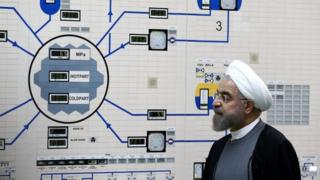Home » Middle East »
Iran warned not to abandon nuclear deal
Western countries participating in the Iran nuclear deal have warned Tehran there will be serious consequences if it takes steps that violate its terms.
The UK, France and Germany said they would still back the deal as long as Iran upheld its commitments.
It follows Iran’s move to suspend some commitments now the US has left the deal and begun imposing new sanctions.
The 2015 accord was intended to curb Iran’s nuclear ambitions in return for relief from sanctions.
But its economy has been badly hit by the new sanctions policy of the Donald Trump administration. The value of Iran’s currency has dropped to record lows and its annual inflation rate has quadrupled.
Iran’s Foreign Minister Javad Zarif said its latest move was within its rights under the deal. It has set a 60-day deadline for European nations to act to protect it from the US sanctions and threatened to resume the production of more highly enriched uranium if they do not do so.
Speaking on a visit to London, US Secretary of State Mike Pompeo said Iran’s latest statement was “intentionally ambiguous”.
Mr Pompeo said that although the US remained on the “same side” as its Western allies on countering Iranian influence, it had a different view on the nuclear deal and he indicated the US would act if trade with Iran continued beyond humanitarian aid.
He had flown to the UK from an unscheduled visit to Iraq. US officials have reported threats to US forces and their allies from Iran, but have given few details. A US aircraft carrier has been deployed to the Gulf.
Who is in the deal and what have they said?
The UK, France and Germany are still part of the deal, as are China and Russia. The US pulled out a year ago.
UK Foreign Secretary Jeremy Hunt said Iran’s latest step was “unwelcome” and he urged Iran “not to take further escalatory steps” and to “stand by its commitments”.
He added: “Should Iran cease to observe its nuclear commitments there will of course be consequences.”
But he also said he continued to support the deal and urged Iran to think “long and hard” before it broke it.
He also admitted there was a “different approach” to that of the US, and Mr Pompeo said after talks in London that the discussion had been “forthright”.
German Foreign Minister Heiko Maas said its position was to “stick by the agreement”, calling it crucial for European security.
French Defence Minister Florence Parly told French media that the European powers were doing everything they could to keep the deal alive but there would be consequences and possibly sanctions if the deal was not adhered to.
Russian Foreign Minister Sergei Lavrov urged all of the remaining parties to fulfil their obligations, and said that Western signatories were trying to “divert attention” from their inability to do so.
China said it “resolutely opposes” unilateral US sanctions against Iran and called for strengthened dialogue.
Mr Pompeo was fairly muted, saying: “We’ll have to wait and see what Iran’s actions actually are.”
But back in Washington special assistant to the president, Tim Morrison, said Iran’s move was “nothing less than nuclear blackmail of Europe” and urged Europeans not to back the Instex, or special purpose vehicle, devised to trade with Iran.
What is Instex?
It’s a new payments mechanism, set up in January by the UK, France and Germany to allow businesses to trade with Iran without being subject to sanctions.
It is supposed to focus on “legitimate trade” in goods “where the immediate need of the Iranian people is greatest”, for example food, pharmaceutical products and consumer goods not subject to sanctions.
Oil, Iran’s main source of foreign exchange, is at the moment not covered and Tehran wants the Europeans to give the system more bite.
But that could put traders at loggerheads with the US sanctions.
Mr Morrison said: “If you are a bank, an investor, an insurer or other business in Europe you should know that getting involved in the special purpose vehicle is a very poor business decision.”
Mr Pompeo said the terms of Instex were “unobjectionable” but any transactions beyond them could draw sanctions.
What did the Iranian statement say?
Iran suspended two parts of the deal, known as the Joint Comprehensive Plan of Action (JCPOA), namely the sale of surplus enriched uranium and heavy water.
Under the deal, Iran is required to sell its surplus enriched uranium – which can be used in the manufacture of nuclear weapons – abroad, rather than keep it.
Iran said it would resume the sales after 60 days if the signatories observed financial and oil commitments and did not back the new US sanctions.
Iran also threatened to begin higher enrichment of uranium, which is currently capped, and start developing its Arak heavy water reactor.
Huge dilemma for Europeans
Iran is seeking to strike a difficult balance: pushing back against some of the restrictions imposed by the JCPOA, while not doing so much as to withdraw from it altogether.
This is an alarm signal but also a warning. Iran is facing growing pain from re-imposed US sanctions.
It wants the Europeans to take urgent practical steps to provide some relief. And if relief does not come, then Iran may well have to re-consider its overall adherence to the JCPOA – which the US abandoned a year ago.
This presents the Europeans with a huge dilemma. They are caught between the Iranians and the Trump administration. Can they continue to back the agreement if Iran is not fully complying with its terms?
The US is likely to insist that there can be no middle way. Iran is either honouring the terms of the JCPOA or it is not.
Source: Read Full Article



